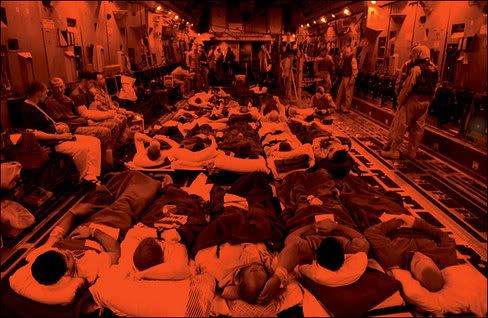It's therefore no wonder that Army recruiters are on the verge of a nervous breakdown. Damien Cave of the New York Times reports that the Army's 7,500 military recruiters, saddled with "a quota of two new recruits a month" and pressured by the Army brass, are suffering from job-related stresses, leading to "stomach problems," "searing back pain," "marital troubles," "bouts of depression," and even contemplation of "suicide" ("For Recruiters, a Hard Toll from a Hard Sell," New York Times 27 Mar. 2005). Pressures to meet the recruitment quota, in the midst of a brutal counter-insurgency war that threatens to continue indefinitely, have led to the doubling of allegations of "improprieties," i.e. "signing up unqualified people to meet quotas or giving bonuses or other enlistment benefits to recruits not eligible for them": from 490 in 2000 to 1,023 in 2004 (Cave, "For Recruiters. . . ," 27 Mar. 2005).
The job of recruitment has become so difficult that "[a]t least 37 members of the Army Recruiting Command . . . have gone AWOL since October 2002" (Cave, "For Recruiters. . . ," 27 Mar. 2005). Many recruiters have requested other assignments, and one has even applied for conscientious objector status:
Many of the recruiters said they have asked for other assignments. One of them is Sgt. Latrail Hayes. Now 27, Sergeant Hayes enlisted in the Army 10 years ago, out of high school in Virginia Beach, continuing a family tradition of military service. He volunteered to be a recruiter in 2000, after 52 jumps as a paratrooper, and at first his easy charm, appeals to patriotism and offers of Army benefits enticed dozens of recruits.On the same page in the same issue of the New York Times, another recruiter, Sgt. Julius L. Baskerville, talks about confronting the battlefield death of his friend Glynn Heighter's younger brother Raheen Heighter, whom he had recruited for the Army. Two other young men who went to the same high school as Raheen's, and who were also recruited from Sgt. Baskerville's station, have died in combat.
But Sergeant Hayes said he started rethinking his assignment as the war went on. Mothers required months, not weeks, of persuasion. And stories he heard from some of his recruits who had gone to Iraq and Afghanistan made him reluctant to pursue prospects by emphasizing the Army's benefits. When his cousin, whom he had recruited, returned from Iraq with psychological trauma, he filed for conscientious objector status in June, to get a new assignment.The application was rejected in November. Now, instead of serving 20 years in the Army, he intends to leave in December, when his tour ends. "There's a deep human connection when you try to persuade someone to do something you've done," he said. "So when it turns into something else -- maybe even the opposite -- it's difficult." (Cave, "For Recruiters. . . ," 27 Mar. 2005)
Sgt. Latrail Hayes, a recruiter who sought conscientious objector status (Marty Katz/New York Times).
These days, he [Baskerville] said, he cannot do his job without thinking of soldiers like Private Heighter.In the New York Times Magazine, on the same day, are a series of haunting photographs of the wounded:
"It's hard to describe," he said. "You're a recruiter on Long Island and there are three casualties, and all three are from the same school.
"What are the chances?" (Damien Cave, "A Salesman, a Mentor and Sometimes a Grieving Friend," New York Times 27 Mar. 2005)
Johnny Dwyer's article that accompanies the photographs ("The Wounded," New York Times 27 Mar. 2005) says that "[a]s of March 18, 11,344 American soldiers had been injured in the war in Iraq" and that "[a]mputation rates among soldiers, according to recent Congressional estimates, have doubled to 6 percent from the historic norm," the other side of the rise in the survival rate (now 87 percent -- up from about 75 percent in Vietnam) of wounded soldiers (Dwyer, 27 Mar. 2005).
In the cargo hold of a C-17 aircraft, soldiers treated at the Air Force Theater Hospital at Balad Air Base, north of Baghdad, await evacuation to a military hospital in Landstuhl, Germany. This photograph was taken on Nov. 13, 2004, during a mortar attack on the base. The red lights indicate ''contingency situations" (Lynsey Addario/Corbis).
Marine Cpl. Matt Piano awaits medical evacuation from Balad Air Base, Iraq (Lynsey Addario/Corbis).
The reality of war, captured by Addario's photographs and Dwyer's article above, has already sunk deep into working-class America, so deep that no patriotic exhortation, financial incentive, or "Good News" propaganda can dislodge it. As long as the Iraq War lasts, military recruitment will continue to deteriorate. Every day, it is becoming clearer that Washington cannot fight a long and savage counter-insurgency war without conscription. The day when Washington acknowledges that will be the moment of truth for the anti-war movement as well as the US working class.







2 comments:
Let us hope the moment of truth you mention for the anti war movement is very soon. Soldiers dying for a lie, civilians dying for a lie,while our president during one of his speeches to his choir, started looking under things on the dais, saying I don't see any WMD's here,I don't see any over there, making a mockery of the deaths caused by his lies-It is disgusting, and I am truly ashamed of what My country is doing. The flag under which I served in the military has been stained with dishonor by men who have no conception of what it is to fight, to die in battle, or more mundanely to even serve honorably in the armed forces of America-yet they send men to die for lies, and great personal profit for themselves-I burn with rage and helplessness at my inability to do anything to stop this-so I write these words in the hope that someones mind might be changed, eyes opened, hearts softened as they see the futility of war. This is not right or left wing, this is death and mutilation, senseless and with out thought of consequences.
Burnie
I am very sorry to hear that your husband, who has given so much to the Marine Corps, is being harassed by the brass.
I wish to give you contact information of several organizations and individuals that may be of assistance to you and your husband in your quest to have this injustice against him redressed.
Here is a short list of organizations and individuals that you may contact. The first three should be able to give you legal advice as to whether your husband has grounds to seek remedies through lawsuits concerning overwork, verbal abuse, and psychological pressures that led to his clinical depression and suicidal thoughts. The rest are contact information of veterans, military families, and GI rights counselors, who support the troops and seek to bring them home and who may be able to help you or know individuals and organizations that can help you.
The Center for Constitutional Rights
Center for Constitutional Rights
666 Broadway, 7th Floor
New York, NY 10012
Phone: (212) 614-6464
Fax: (212) 614-6499
E-Mail: info@ccr-ny.org
http://www.ccr-ny.org/v2/about/contact.asp
National Lawyers Guild Military Law Task Force
318 Ortega Street, San Francisco, CA 94122
Kathy Gilberd, KathleenGilberd@aol.com, 619-233-1701
Marti Hiken, mlhiken@pacbell.net, 415-566-3732
Marguerite Hiken, (415) 956-1360
http://www.nlg.org/mltf/
Staughton Lynd (veteran civil rights attorney)
SALYND@aol.com
Stan Goff (former Special Forces Master Sergeant, now active in organizing veterans and GIs)
sherrynstan@igc.org, sherrynstan@earthlink.net, stan@ncwarn.org
Military Families Speak Out
P.O. Box 549
Jamaica Plain, MA 02130
Phone: 617-522-9323
E-Mail: mfso@mfso.org
Nancy Lessin, 617-320-5301
Charley Richardson, 508-277-9466
http://www.mfso.org/
Bring Them Home Now
216 South Meramec Ave.
St Louis, MO 63105
E-Mail: BTHN@mfso.org
http://www.bringthemhomenow.org/index.html
The GI Rights Hotline
(An organization that mainly helps soldiers obtain military discharges or fight harassment and discrimination, but it may have leads that it can give you.)
(800) 394-9544
(215) 563-4620 Fax (510) 465-2459
Mailing Address:
405 14th Street Suite 205
Oakland, CA 94612
girights@objector.org
http://girights.objector.org/
Aside from contacting aforementioned individuals and organizations, I recommend that you contact other Marine Corps and Army recruiters and their families, ask if they are confronting problems similar to your husband's, and see if you can form a support group of recruiters and their families who are put into the same intolerable circumstances by the brass who are in denial about what the Iraq War has done to military recruitment. Even if the Center for Constitutional Rights, etc. can find you an avenue of legal redress, it will be good to have a support group in which you can share your problems and help one another in a spirit of mutual aid.
Also, think about contacting local organizations questioning the Iraq War or helping soldiers obtain conscientious objector status. You and your husband may not see the Iraq War in the same way as anti-war activists do, but activists tend to have contact information of local civil rights lawyers, GI rights counselors, sympathetic clergy and politicians, and other people and organizations that can provide assistance to you and your husband.
Post a Comment